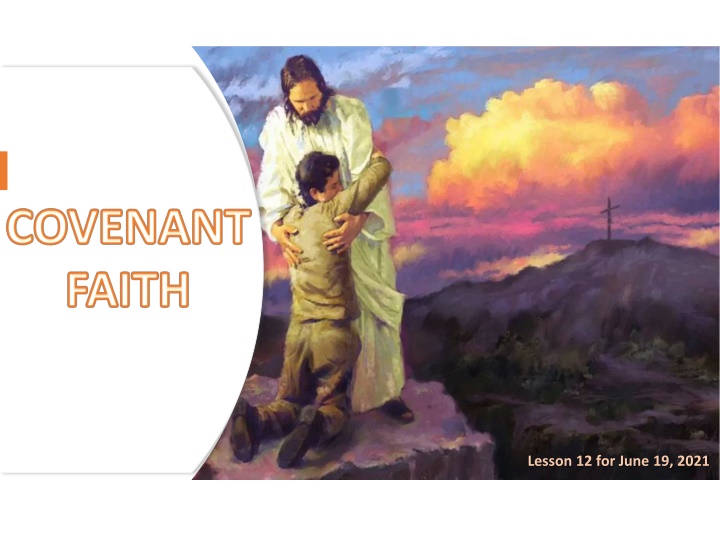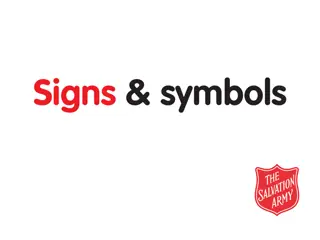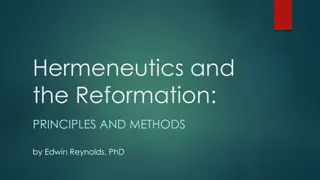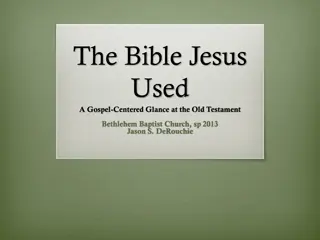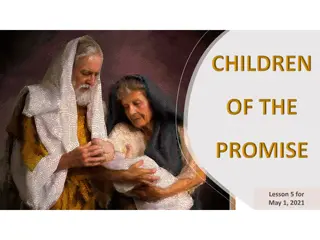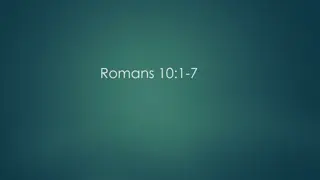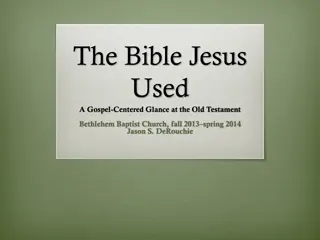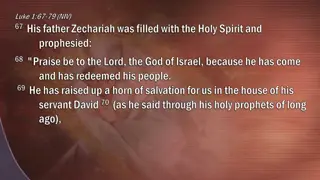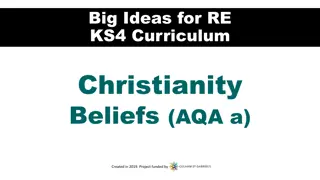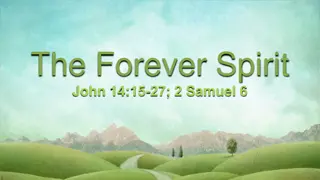The Everlasting Covenant and Salvation
Delve into the depth of salvation as a gift and the significance of Christ's sacrifice in the everlasting covenant. Explore why righteousness is imputed to us and how faith plays a vital role in receiving the promise of everlasting life through the Cross. Reflect on the love and sacrifice of Jesus, the heart of the covenant, as He bore our sins to grant us righteousness and eternal life.
Download Presentation

Please find below an Image/Link to download the presentation.
The content on the website is provided AS IS for your information and personal use only. It may not be sold, licensed, or shared on other websites without obtaining consent from the author.If you encounter any issues during the download, it is possible that the publisher has removed the file from their server.
You are allowed to download the files provided on this website for personal or commercial use, subject to the condition that they are used lawfully. All files are the property of their respective owners.
The content on the website is provided AS IS for your information and personal use only. It may not be sold, licensed, or shared on other websites without obtaining consent from the author.
E N D
Presentation Transcript
The Week at a Glance: Why must salvation be a gift? Why could only Someone equal with God ransom our souls? What makes Abraham such a good representative of faith? What does it mean that righteousness is imputed, or credited, to us? How can we make the promises and hope found in the Cross our own?
But that no one is justified by the law in the sight of God is evident, for the just shall live by faith. Galatians 3:11
For God so loved the world that He gave His only begotten Son, that whoever believes in Him should not perish but have everlasting life. (John 3:16) The cross is the heart of the everlasting covenant. Without the cross, there would be no covenant, hope, or salvation. Jesus risked everything by accepting the punishment that we deserved. His love is stronger than death. He accepted the eternal separation from the Father because He loved us.
For He made Him who knew no sin to be sin for us, that we might become the righteousness of God in Him. (2 Corinthian 5:21) Christ was treated as we deserve, that we might be treated as He deserves. He was condemned for our sins, in which He had no share, that we might be justified by His righteousness, in which we had no share. He suffered the death which was ours, that we might receive the life which was His. "With His stripes we are healed." {Desire of Ages pg.25}
But God forbid that I should boast except in the cross of our Lord Jesus Christ, by whom the world has been crucified to me, and I to the world. (Galatians 6:14) Jesus sealed the covenant with His sacrifice. We must do only one thing to be part of the everlasting covenant: to believe. We will be saved if we accept by faith that Jesus died in our place on the cross.
THE COVENANT AND THE SACRIFICE Jesus rescued us from the slavery of sin and death by voluntarily shedding His precious blood on Calvary. Knowing that you were not redeemed with corruptible things, like silver or gold, from your aimless conduct received by tradition from your fathers, but with the precious blood of Christ, as of a lamb without blemish and without spot. (1 Peter 1:18, 19)
THE COVENANT AND THE SACRIFICE Salvation is free. But it had a cost: the life of the son of God. For the wages of sin is death, but the gift of God is eternal life in Christ Jesus our Lord. (Romans 6:23) Jesus is the only one who has life in Himself. The lives of everyone else depend on God, our life is not our own. Therefore, no created being even the angels could die the eternal death in our place.
THE COVENANT AND THE SACRIFICE Why could only Someone equal with God ransom our souls? And this is the testimony: that God has given us eternal life, and this life is in His Son. He who has the Son has life; he who does not have the Son of God does not have life. These things I have written to you who believe in the name of the Son of God, that you may know that you have eternal life, and that you may continue to believe in the name of the Son of God. (1 John 5:11-13)
And he believed in the Lord, and He accounted it to him for righteousness (Genesis 15:6) What makes Abraham such a good representative of faith?
THE HISTORY OF ABRAHAM Genesis Chapter Abraham s Age 11 Terah moved to Haran where he died aged 205 12 Abram to Canaan - Egypt, lies about Sarai 13 Abram-Lot part, God makes a promise to Abram 14 Five Kings attack Sodom - Abram rescues Lot 15 God says he will be Abram s shield, that his descendants will be of his own DNA, The statement is made And he believed in the Lord, and He accounted it to him for 75 righteousness.
THE HISTORY OF ABRAHAM Genesis Chapter Abraham s Age 16 Sarah tells Abram to have a child by Hagar. 85 17 Abram & Sarai renamed, circumcision initiated, God says Sarah will have a son 18 God visits on the way to Sodom and repeats the promise of a son by Sarah. 20 Abraham again lies about Sarah. 21 Isaac is born. 22 God commands Abraham to sacrifice Isaac. 23 Sarah dies. 25 Abraham remarries and had 6 sons. He dies 175 99 100 137
Genesis 15:6 was used two times by Paul and once by James as an example of salvation by faith (Romans 4:3; Galatians 3:6; James 2:23). How could God consider Abraham righteous if he obviously was not? God considered him righteous because of this act of faith. however, he failed by taking Hagar and lying about his relationship with Sarah.
THE FAITH IMPUTED But to him who does not work but believes on Him who justifies the ungodly, his faith is accounted for righteousness. (Romans 4:5) Justification i.e., to be made righteous is an act of faith for the believers, and an act of grace by God. We cannot bring any work of righteousness before God that would make us righteous (Titus 3:4-7). Our faith is accounted for righteousness. What does that mean?
THE FAITH IMPUTED What does it mean that righteousness is imputed, or credited, to us? It means that we are considered righteous although we are not, so we can enter Heaven. We are considered righteous because the righteousness of Christ is imputed to us. This justification results in sanctification (love, obedience, character development...). No matter how holy we are, we are righteous before God by faith.
RESTING ON THE PROMISES How can we make the promises and hope found in the Cross our own? For all the promises of God in Him are Yes, and in Him Amen, to the glory of God through us. (2 Corinthians 1:20) The covenant is based on God's faithful promises. If we claim those promises by faith, they can improve our lives today.
RESTING ON THE PROMISES The assurance of our salvation brings us peace. Romans 5:1 Therefore, having been justified by faith, we have peace with God through our Lord Jesus Christ,
RESTING ON THE PROMISES We are delighted to know that we can trust God. Psalm 34:8 Oh, taste and see that the Lord is good; Blessed is the man who trusts in Him!
RESTING ON THE PROMISES Nothing will be too heavy for us if we trust Jesus. Matthew 11:29-30 Take My yoke upon you and learn from Me, for I am gentle and lowly in heart, and you will find rest for your souls. For My yoke is easy and My burden is light.
RESTING ON THE PROMISES We can follow the example of Jesus by faith. Philippians 2:7-8 but made Himself of no reputation, taking the form of a bondservant, and coming in the likeness of men. And being found in appearance as a man, He humbled Himself and became obedient to the point of death, even the death of the cross.
Righteousness is obedience to the law. The law demands righteousness, and this the sinner owes to the law; but he is incapable of rendering it. The only way in which he can attain to righteousness is through faith. By faith he can bring to God the merits of Christ, and the Lord places the obedience of His Son to the sinner s account. Christ s righteousness is accepted in place of man s failure, and God receives, pardons, justifies, the repentant, believing soul, treats him as though he were righteous, and loves him as He loves His Son. This is how faith is accounted righteousness; and the pardoned soul goes on from grace to grace, from light to a greater light. E. G. W. (God's Amazing Grace, September 14)
The End These slides have been adapted from those prepared by Sergio Fustero and Eunice Laveda, members of the Seventh-Day Adventist Church in Spain. The originals can be found at https://www.fustero.es/index_en.php A copy of my expanded version can be found at www.thornleighadventist.org.au/ss_adult.htm
